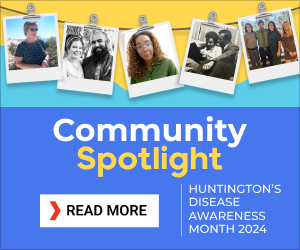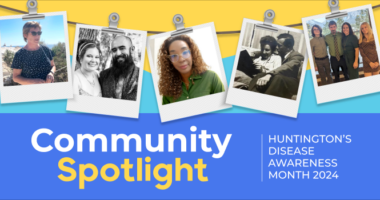The Hurdles We Faced with DNA Testing for Huntington’s Disease

Second in a series. Read part one.
Based on the number of television commercials touting DNA testing, finding out information about one’s genes has become de rigueur these days. As I mentioned in my last column, however, when there’s the possibility of having inherited genes that might cause havoc to one’s health, a genetic test could represent an emotional land mine.
My father-in-law had Huntington’s, and my wife, Jill, was involved in his care, so she is knowledgeable about the disease in a way that most people aren’t. Last year, when she said she wanted to get the genetic test done but was having a hard time making the appointment, I said I would take care of it. How hard could it be? I see commercials every day about mail-in genetic tests. You swab your cheek, send it to a lab, and get your results within a few weeks, right?
Wrong.
The test must be prescribed by a neurologist who specializes in Huntington’s. These doctors, for the most part, are located in large cities, which means you have to travel there. Once you start the process of genetic testing, you must meet with a neuropsychologist, a social worker, a psychiatrist, and a genetic counselor. This is a nonnegotiable process. It is meant to be helpful for patients, but for us, it felt more like we had to defend her decision to be tested.
They also wanted to know how you will handle the news if you have the disease. Jill said that she didn’t know how she would react. Honestly, she didn’t want to think about it because she was in denial about having Huntington’s.
The reality is that the possibility of the disease causes people to put a lot of thought into their futures. Jill estimates she thought about it at least 10 times a day before she felt like she was possibly showing symptoms, and that number tripled after she noticed small “twitches.”
It took a lot for her to decide to go ahead with the genetic test, but when she was ready, she was ready. For the past 20 years, ever since her father was diagnosed, she has read, researched, talked, and thought about it enough. She wanted to know — we wanted to know — right then.
That was not to be.
We were surprised by the fact that there were so many hurdles in the way of getting an answer to a question about her health. I wonder if tests for other illnesses require the same level of scrutiny.
This is a legitimate point that our 22-year-old daughter has been pondering lately. Our daughter is a bright, talented, beautiful young woman. She is someone who has spent her life knowing and understanding the implications of the gene and the possibility she could test positive. She has done so much research on the subject she could probably write a book on it (and that’s not just a father bragging).
Our daughter was scheduled to have the genetic test done on April 1. Remembering how exhausting and upsetting it was for my wife and me, we asked if she could opt out of meeting the entire team because she has not been showing any symptoms. What could they accomplish, we wondered, by having her go through the same process as someone who is presenting with symptoms? The answer was no, she could not, because that’s their policy and it is “to benefit the patient.”
When we talked with our daughter after her appointment, she said that she felt as if the policy were more important than the patient. As helpful as it is to have a supportive medical team, it’s more important to remember that your care should not be one-size-fits-all.
Our daughter pointed out something we never really thought about. She said that things are different now; we aren’t living 15 years ago, which is when she witnessed her grandfather dying from the disease. Today, genetic testing is common. Back in her grandfather’s day, it wasn’t. My wife and daughter wanted a simple answer to a straightforward question: Did they have the disease? Instead, the process to get the genetic test was emotionally grueling because of all the people you have to talk to — even though no one knows whether you have it or not. Living with the thought of possibly having Huntington’s is cruel enough, so why make it even more of a burden with all the hurdles?
Ultimately, what I felt throughout seeing my wife and daughter be frustrated by a system chock-full of protocols — and what they felt, as well — was what many families facing this disease’s deadly possibilities have felt. We were overwhelmed by a lack of control over the situation, and this is the curse of facing a rare disease: a sinking feeling of helplessness.
***
Note: Huntington’s Disease News is strictly a news and information website about the disease. It does not provide medical advice, diagnosis, or treatment. This content is not intended to be a substitute for professional medical advice, diagnosis, or treatment. Always seek the advice of your physician or other qualified health provider with any questions you may have regarding a medical condition. Never disregard professional medical advice or delay in seeking it because of something you have read on this website. The opinions expressed in this column are not those of Huntington’s Disease News, or its parent company, BioNews Services, and are intended to spark discussion about issues pertaining to Huntington’s disease.








Comments
mom
We had a similar experience, the process for genetic testing was traumatizing and less than respectful. It was incredibly paternalistic. The process of having to meet with many strangers after traveling hours was not helpful. In the end, we compelled our family physician to find a way to order the test. She already had a therapeutic relationship with my son, and did just the right things, referred us to a neurologist, and helped us secure counseling locally. This article helped so much to affirm my experience. When did doctors, counselors etc get to decide how and when an individual gets medical information about themselves? I feel certain that the HD communities are well intentioned and helpful to many. But encouraging self determination is the beginning of respect and they missed that bar by a mile with my family.
Carlos Briceño
What you wrote really resonated with me because everything you shared is what we felt too. I feel for you that you were traumatized and dealt with paternalistic attitudes. What a blessing that you had a caring and understanding physician who was able to do an end around. We are hoping that talking about this and bringing this to the world's attention, through this column, might be able to influence and change some minds and policies so that a one-size-fits-all picture might be reconsidered and is not the only lens that the medical community focuses on when trying to help people who potentially might have Huntington's. I realize this might be a pipe dream, but this is a legitimate subject that I hope leads to some legitimate conversations among leaders in the HD communities, all of whom we respect because they are trying their best to help families, but if that is their intentions, then surely we have a right to be understood in terms of, as you so articulately put it, self determination and respect. My prayers go out to you, your family and your son.
brigitte
Places that overdo the pre testing "counselling" process are truly detrimental to improving the situation regarding awareness/stigma, treatment, prevention and research into treatments for Huntington's disease. Finding out when at risk for this disease is necessary to be able to make informed decisions over either shorter life span or not limiting a disease free typical life span by assumptions of potentially being positive for the gene when not. Any developing treatments and research into this disease depends on persons at risk to have their gene status discovered. Furthermore, were all persons at risk diagnosed in early adulthood it would greatly reduce the births of additional Huntington's disease gene carriers. There is nothing that any pre testing counselling can provide to cushion the inevitable blow of getting a positive test result. Nor was there any cushion when recognition of being at risk for the disease occurred. Yet people will cope and adjust to what they must at whatever capacity they have. Life is fast and the years rush by, it's not that long when many who are positive will commence having some symptoms from the younger years realising being at risk and a need for testing. Not testing won't make the disease go away, nor the knowledge of being at risk (even for some who would be negative). Informed decision making is championed for all important life areas, especially medical decisions. Hence pretending that not testing when at risk for HD is utterly insane, and the excuse of no cure is pathetic today. Going by that logic 90% of medical conditions would not be worth diagnosing, since many can only be treated to various levels, a lot less actually cured. Get rid of the stigma and secrecy around this disease and make testing available on request with the option of some free counselling sessions for those with a positive result. That's when it could be desirable to facilitate the transition of assimilating the news early on. No one knows how they will initially feel the hit of the positive test result in advance. All they can have done is braced themselves to get on with what must be done, the testing so they can make informed decisions over the course of their life, the only control they have over the disease.
Carlos Briceño
I really appreciate your eloquence and agree with what you wrote 1,000-percent! Thank you so much for sharing and for getting more people to understand the bigger picture!
Christopher
My Dad’s Mother and my Dad passed away as alcoholics. My shaking is getting bad now that I’m 40. I am maybe misdiagnosed with a psychosis. And the only reason I’m reaching a possible HD conclusion is that my 10 year old niece has PANZ, we both were bitten by a tick on the back of our neck as toddlers, but I also had osteomyelitis in my heal. Anyway don’t mean to digress or bore, but I am wondering if HD could be a progression of people with the over 30 some number of CAG gene sequence who had Lyme, staff, strep, syphilis. The medical community does not test the many variant strains to document and test against, but only if a blood sample is ‘reactive’.
I don’t mean to overstep my bounds, but if a possible cure for PANZ or PANDA as it is called in adults could keep people with too many CAG gene sequences from developing HD then it would help knowing that HD had a catalyst. Causing some to develop symptoms and others not.
Ever since I saw Ani Difranco play a character in the Hospital with Huntington’s Disease I thought it might be my fate.
Thank you for answering my question about what to do next.
Carlos Briceño
I'm so sorry to hear about your family's battles with alcoholism. That's a difficult disease to deal with. And I feel for you that you are suffering from so many health issues yourself. As far as what to do next, I'm sorry I can't give you an answer. I'm not a doctor, but I do hope you can find a medical professional team that can help you.
Christopher Shellman
Thank you for the advice, I went to an integrated healthcare service to try to find the cause of my symptoms. They were quick to discover very high Ferritin, about 700. They then tested for Crohn’s disease, a DNA test, but I did not have the markers or DNA dispositions for Crohn’s. In researching on searches combining “high ferritin” and “Huntington’s” I found this:
https://tidsskriftet.no/en/2015/08/case-reports/man-his-50s-high-ferritin-levels-and-increasing-cognitive-impairment
. . . just below the figure of a cerebral MRI the case study reveals how over decades iron had deposited in the brain, “The disease can give rise to parkinsonism, but shows greater phenotypic resemblance to Huntington’s disease (6).” Anyway thank you for the forewarnings, still it is not very caring for medicine to withhold a test that could ease my mind about our family’s complex medical history.
Christopher
Carlos Briceño
I'm so sorry to hear about your issues with the medical establishment. I agree that witholding the test is not a caring thing to do. I hope things go better for you in the future whenever you deal with them again.
AG
Thank you for writing this. When I tried to get information about getting tested I was discouraged by the counselor over the phone. And had I decided to push back and get tested it would mean three appointments and about $1K. Their reasoning was that the suicide rate goes up once people find out, and that people then live their life around being an HD patient, rather than the person they were prior to getting tested who had possibilities and didn't have their life revolve around how a disease would affect them. All in all I get where they are coming from but if they had an affordble mail in test with no barriers I would have used it already because knowing I am at risk due to family history never goes away.
Carlos Briceño
Thanks for writing. Your story and frustration sound very familiar. I feel for what you went through and how it made/makes you feel. It just isn't fair. Imagine this for a moment: Imagine if enough people band together and raise our voices collectively if some health-care professionals will notice and offer some reasonable pathways for those who have HD in their family history to deal with it in empathetic and sensitive ways that makes life easier for those with the potential of having HD. Perhaps some things will change if that were to ever occur.
What I'm saying is this: if you want to be a part of a group of people who want to inspire changes in the health-care system as it concerns HD and genetic testing, post a comment here.
Here's a quote for inspiration:
"If you think you're too small to have an impact, try going to bed with a mosquito in the room."
-- Anita Roddick
Linda Murray
I am the mother and caregiver of a son with HD and who will turn 60 later this year. My ex-husband’s family never shared the real cause of my father-in-law’s condition. I had heard rumors of Huntington’s Chorea as it was then called, and which the family denied. When my son was 10 I obtained a copy of my father-in-law’s death certificate and autopsy reports. Both noted he had HD for 18 years. At this time there was no internet for research, but we did go for genetic counseling and found that there was a 50/50 chance my son would eventually get HD. We were told if his father didn’t get it, my son also would not get it. From the time my son was 12 until he was 36 we had no knowledge of his father’s whereabouts. We found him in 1995 when my son was 36 at which time we also found that he in fact did have HD and was in a local facility.
In 2002 my son was hospitalized and I requested (with my son’s approval) that he be tested for HD, which was denied. A couple more hospitalizations and more requests for testing again were denied. We did start going to the neurology clinic locally, based on the family history and hospitalizations. In 2006 we were finally set up with an appointment according to the HD protocol. The neuropsychologist assigned to us was from another division, someone we had never seen before, or since, and who was very arrogant during his assessment. He told us my son was “not emotionally stable enough to get the results”. I asked him, “if he does have the gene for HD and his depression, etc. is the result of HD, when will he ever be stable enough to get the results in his opinion” and he told us “never”. But I guess he was stable enough to be given that harsh critique to his face. I left feeling more defeated than ever. He later sent a bill for $500.00!
Should he have been given this same response also when, during treatments and testing, because of swallowing issues (due to HD) he was diagnosed with Thyroid cancer? Why was he stable enough for that diagnosis?
I began searching worldwide to see if he could be tested elsewhere and found the same protocol in effect everywhere. I had a friend that is a judge and he was willing to write and order to test him and found that it would not be accepted or honored.
Finally, in 2008, the neurologist that we were seeing understood our frustration and was understanding enough to get him tested without the ‘protocol ‘ interference. We were put through 6 years of anxiety and frustration to get the results we knew in our hearts would be, that yes he did have HD, and which did also answer a lot of questions about his demeanor during that time. Now we live one day (or hour) at a time, the best we can!
Carlos Briceño
What a difficult journey. My heart goes out to you. There needs to be changes by the medical community, because stories like this show the absurdity of what they deem medical "care." This is not care. This is arrogance and a lack of empathy on their part.
Ron Fillmore
This article was right on target with situations all true to life .
Jennifer A
Honestly, I think HD testing is a money grab by places that have a monopoly on the process. It cost well over $1,000 with no one quite sure of the price up until the time of each visit. They made me wait months for appointments, all during the weekday so I had to miss work. The testing programs act like the worst thing in the world is to get HD. Life is so much more complex and beautiful than one diagnosis!
Carlos Briceño
I'm sorry you had such difficult and expensive time. I hope things go well for you in the future.
Carlos Briceño
Thank you for sharing all that!
Erin Paterson
I am so sorry that the process was so difficult for you and your family. I am glad that you have each other for support.
Carlos Briceño
Thank you, Erin, for your kind and thoughtful words. We really appreciate them.
Abigail Zelaya
Hi I totally agree with everyone personal statements. My father has HD, I have recently become is caregiver at that age of 21. It’s been a rough process, very limited resources, very uneducated doctors and Heath care providers. As a nurse it baffles me what incompetent the our health are system is. Getting treatment and are is so complex. It is already hard enough having HD but having to deal with a faulty system of ignorance and disrespect by health care workers is just sad.
I’m only 21 and a new nurse I recently tried to get test of HD. Denied for many different reasons fist lack of education from doctors about this disease secondly as many have written it costs money. I been told why do you want to know? Your to young. You probably don’t have any symptoms. So what’s the reason. It’s my right to know. How are we going to advance in learning more about HD if the few that are willing to get tested are denied.
People need to be educated about HD, testing should not be denied to anyone. We all have the right to know.
It is very frustrating. I have Yet to be tested.
Carlos Briceño
My heart goes out to you regarding your dad's diagnosis and all you have to deal with at your young age. I hope you have a good support system around you. One day at a time. That's all we can do. Hang in there!
B.J. Viau
Carlos - just reading this article from a few years ago. Amazing points that you unfortunately had to have experiences with, twice! I forget if we've talked about this, but I have been working tirelessly and making progress ot launch HD Gene Co in 2022 which will streamline this process based on what is best for the patient and not "the system". Costs, timelines and the counseling experience will all be streamlined to offer people a similar experience regardless of where they live in the USA. www.hdgeneco.com/
Carlos Briceño
B.J., this comment is long overdue, as I missed it when too much time went by during a time that I was so busy at work that I didn't have much time to keep up with people's comments. I apologize. Your web site is amazing. What a brilliant idea! I would love to interview you about it one day to write about it in my column as I think it needs to be publicized broadly. I just have to figure out when I might have time to do that and time it so that it's published in the new year. Thank you for all you do for the HD community!